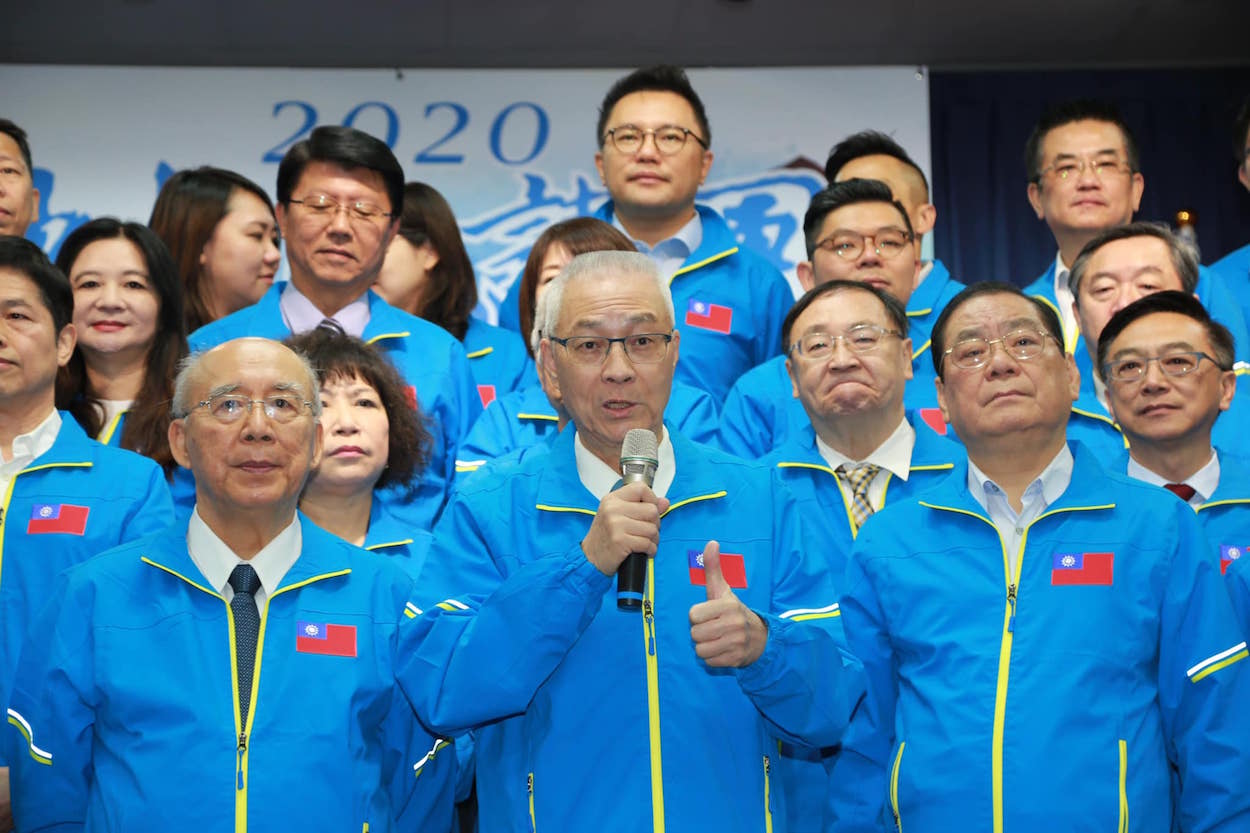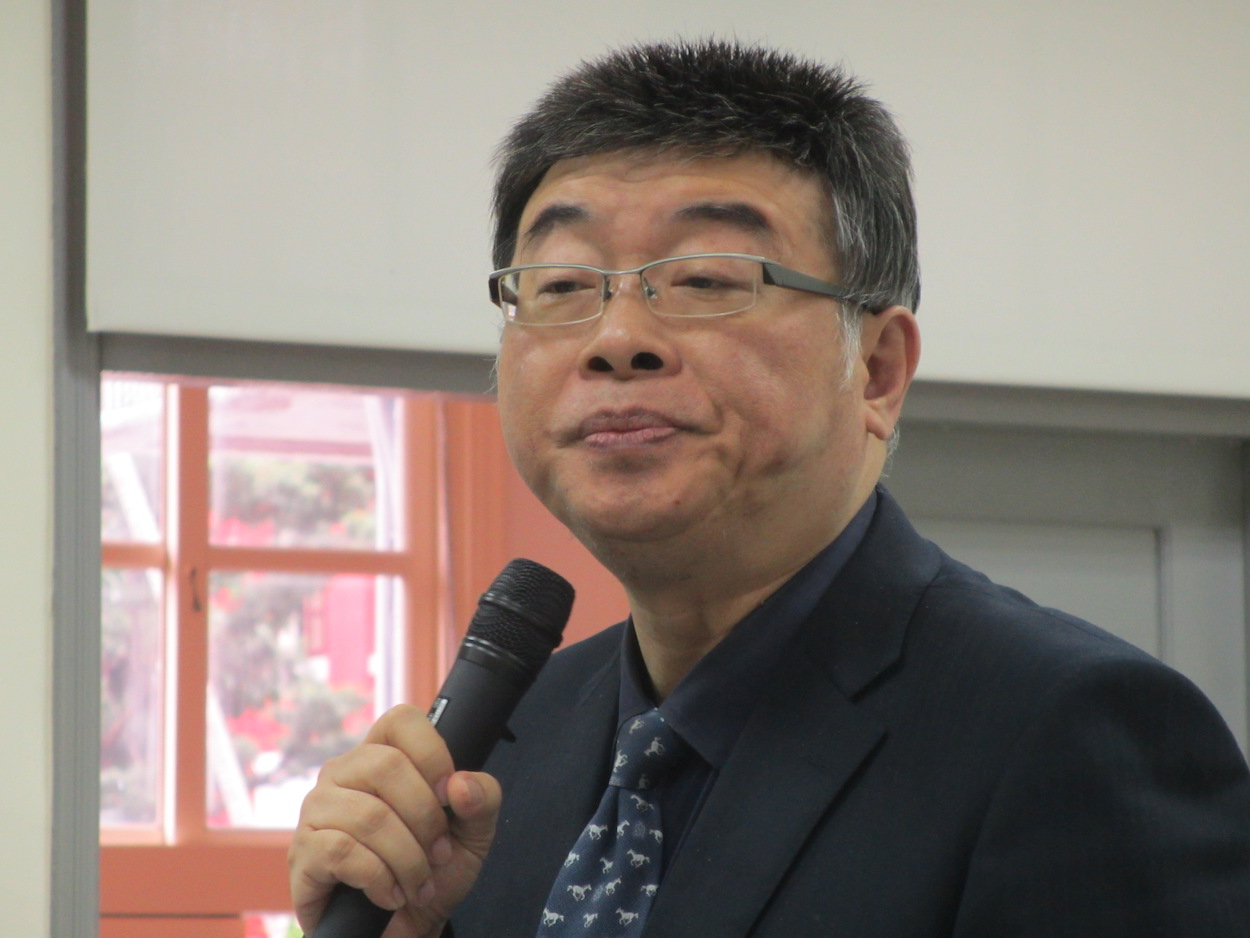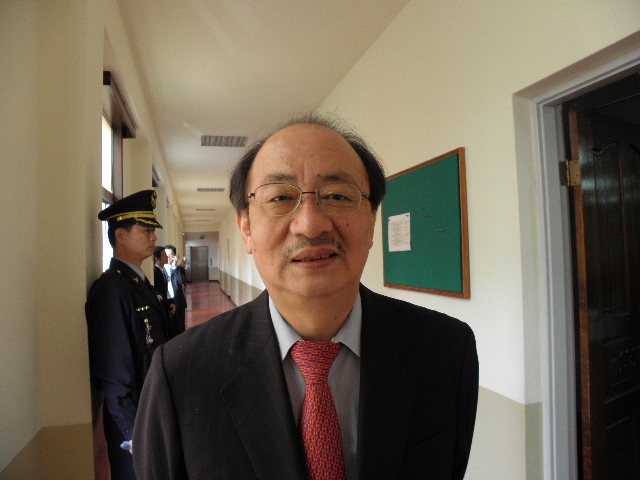by Brian Hioe
語言:
English
Photo Credit: Wu Den-yih/Facebook
THOUGH OFTENTIMES more attention is focused on the district election races in Taiwan, voting on the basis of the so-called “party vote” will also be a significant determinant of the balance of power in the Taiwanese legislature that results from January elections. Namely, in terms of voting for the legislature, the Taiwanese electoral system involves voting for 74 legislative seats which represent local electoral districts, 34 legislative seats who are voted for on the basis of proportional votes for parties, and 6 legislative seats reserved for indigenous.
The party lists of the KMT, DPP, and NPP, consisting of the candidates who are on the list for proportional voting for parties, were announced in the last week. The party lists are revealing of the current ideologies guiding the major political parties currently represented in the Taiwanese legislature. In particular, one notes that first dozen or so legislators of the KMT and DPP are seen as in the “safety zone” of individuals who are more or less guaranteed a seat in the legislature if voting follows past patterns.
 KMT chair Wu Den-yih (center). Photo credit: Wu Den-yih/Facebook
KMT chair Wu Den-yih (center). Photo credit: Wu Den-yih/Facebook
The announcement of the KMT’s initial party list was surprising to some, because of how heavily the party list draws from political candidates with a long history of pro-China stances—apparently with no consideration of how this might hurt the party. Reactions against the list have already been strong enough that the KMT announced that it would be withdrawing and revising its party list a few days after it was released. Criticisms from within the party notably came from legislator Jason Hsu, who criticized the list as too dependent on older, conservative politicians. Hsu, 41, is one of the KMT’s younger legislative representatives.
On the KMT party list, party chair Wu Den-yih was originally placed at the number ten position. This has resulted in blowback, since Wu is the first KMT chair to put themselves on the party list in the party’s history, something seen as an abuse of power. Others demand that Wu should not have such a high position on the party list in order to answer for his failures in leadership as chair. Wu was later moved to fourteen in the revised list.
At the number one position was originally Asian Police Association secretary-general and former Central Police University president Ye Yu-lan (葉毓蘭), who has stoked controversy for comments supportive of Hong Kong police officers in the current set of protests. Ye was moved to number two in the second list. In the number two position was originally former party caucus whip and Financial Supervisory Commission Tseng Ming-chung (曾銘宗), who has taken a proactive role in attempting to block legislation aimed at regulating individuals or individuals acting as representatives of the CCP in Taiwan, claiming that this would lead to a “Green Terror” led by the DPP. In the new list, Tseng was moved to number one.
At the number four position was former lieutenant general Wu Sz-huai (吳斯懷), who visited China to listen to a speech of Xi Jinping’s in 2016. Wu is a leader of the “800 Heroes” anti-pension reform group, known for its violent protests against the Tsai administration’s efforts to reform the pension system used as a reward for political loyalty to members of the military, public servants, and teachers in authoritarian times. Wu remains number four on the new list. Of the controversial candidates on the KMT party list the new list, only former legislator Chiu Yi (邱毅), an advocate of unification who has openly stated that supporters of Taiwanese independence should be “decapitated” once unification is achieved, was removed altogether. Chiu originally was number eight on the list.
The strongly pro-China leanings of the KMT party list is proof to contrary of the common view in international media that ongoing demonstrations in Hong Kong against the deterioration of democratic freedoms has had such a massive effect on Taiwanese political discourse that this all but ensures a DPP victory. Despite the current protests in Hong Kong, it seems that the party was willing to largely shrug off criticisms of its China-friendly orientation by running candidates viewed as strongly pro-China. The KMT’s new party list is unlikely be any more appealing to the public at large, seeing as it largely retains the same individuals and only changes the order slightly.
 Chiu Yi. Photo credit: Public Domain
Chiu Yi. Photo credit: Public Domain
The NPP’s party list choices have proven surprising as well. The NPP list notably draws from individuals with a background in activism, in order to shore up the party’s activist credentials, and from individuals from a diverse professional background, likely with the aims of generating the public perception that the party consists of regular, everyday people and not professional politicians. As such, many of the party list candidates are relatively publicly unknown figures. That being said, despite the party’s reputation as a youth-oriented party, its candidates largely do not include the younger party politicians and primarily consists of individuals in their 40s and 50s.
Former party chair Huang Kuo-chang, the remaining party heavyweight of the NPP after internal splits led to the departure of Freddy Lim, is at the number four position. With it a question as to how much party votes the NPP will receive after its internal party crisis exploded out into the public in the last half-year, it is widely believed that Huang was not put at the number one position in order to attract votes from voters that fear Huang being ousted from the legislature. This would be leveraging on that Huang is currently the NPP’s most famous politician, though Huang declined to run for reelection in Xizhi. Some take this of a sign that Huang has failed to develop strong local ties during his four years as legislator, particularly after Huang was nearly ousted by a recall vote because of his strong stance in support of gay marriage.
Handy Chiu, another former party chair, is at the number two position, in line with that he is also a high profile NPP politician, and reflective of the NPP’s strong local presence in Hsinchu. The NPP performed best in Hsinchu during 2018 local elections, winning four city councilor seats.
Much attention has gone to that Wang Wan-yu (王婉諭), the mother of Little Lightbulb, the four-year-old girl randomly decapitated by a man on a street in 2018 in an incident that shocked Taiwanese society, is the NPP’s number three candidate. Wang became widely known in the aftermath of the killing for refusing to demand the death penalty for the killer, and subsequently became an advocate for judicial reform. The NPP may be aiming for a similar strategy as running Hung Tzu-yung in 2016. Hung Tzu-yung is the sister of Hung Chung-hsiu, the military cadet that died under mysterious circumstances in the incident that sparked the Citizen 1985 protests, though some have accused the NPP of selecting Wang as its candidate in the absence of other qualifications.
Two of the NPP’s candidates have proven unusual, however. Chen Yung-ching (陳永興), the number eight candidate, is the spokesperson of the civic-oriented independent media platform People News, former independent legislature, former Taiwan Solidarity Union candidate, and a former advisor to Chen Shui-bian. Chen was also part of the Formosa Alliance and, as such, advocated that William Lai should be the DPP’s presidential candidate in 2020 instead of Tsai Ing-wen.
 New Power Party candidates posing for a photo. Photo credit: New Power Party/Facebook
New Power Party candidates posing for a photo. Photo credit: New Power Party/Facebook
The refusal of the NPP to openly endorse Tsai Ing-wen was one of the major issues that provoked splits in the party, but Chen’s inclusion on the party list suggests that some elements of the party may not have been opposed to Tsai because of a desire to avoid endorsing the DPP —as a party founded on the basis of being a “Third Force” distinct from both the KMT and DPP, with the view that both parties have grown corrupt over the years—but as having supported Lai. Alternatively, the NPP may hope for closer ties with the Formosa Alliance because of the large financial resources of the party.
To this extent, even more unusually, tech entrepreneur and former Google employee Ben Jai (翟本喬) is the party’s number five candidate. Jai’s profile resembles that of other Taiwanese tech entrepreneurs or Taiwanese employees of international firms that later became politicians, such as former NPP city councilor candidate Hsiao Hsin-cheng or current DPP legislative candidate Enoch Wu, but one notes that Jai endorsed Hung Hsiu-chu of the KMT—a deep Blue figure that was polarizing within even the KMT—in 2016.
The DPP’s party list, on the other hand, saw controversial last-minute changes. Reports of the DPP’s initial party list indicated that the DPP’s party list leans heavily into drawing candidates from progressive civil society, though the DPP tarried on announcing its party list for weeks and then only released information on some party list choices, with widespread speculation that this was due to internal controversy.
Indigenous Television Network reporter and noted indigenous activist Tuhi Martukaw (洪簡廷卉) was the DPP’s number one candidate on the initial list. Tuhi is widely known for leading Taiwanese indigenous delegations to the United Nations Permanent Forum on Indigenous Issues in New York City every year. Her nomination followed the pattern of many indigenous legislators that began as journalists. As the first legislator on the party list, and reminds of the NPP nominating journalist Kawlo Iyun as its first party list legislator in 2016, suggesting that the discursive influence of the NPP did influence the DPP’s original choice of nominations.
Fan Yun, the founder and chair of the Social Democratic Party, was the number four candidate. Fan, a leading figure of the Wild Lily Movement in 1990, a pivotal event in Taiwan’s democratic transition, is of the same age cohort as individuals that later became “middle-generation” DPP politicians, such as Taoyuan mayor Cheng Wen-Tsan, who is seen as a possible DPP presidential candidate once Tsai is ineligible to run for another term. As Cheng and a number of DPP middle-generation politicians were also participants in the Wild Lily Movement, Fan’s sudden entrance into the DPP is likely because of trust accumulated through past ties.
 Fan Yun. Photo credit: Fan Yun/Facebook
Fan Yun. Photo credit: Fan Yun/Facebook
The tenth seat on the DPP party list was Hung Sheng-han (洪申翰), the deputy secretary-general of the Green Citizen Action Alliance (GCAA). Hung notably debated Huang Shih-hsiu, a pro-nuclear advocate and a former legislative assistant to Hung Hsiu-chu, on a nationally televised debate during the national referendum on nuclear energy last year. It is quite surprising that Hung decided to join the DPP, given that the GCAA is organizationally highly critical of both the DPP and KMT despite being an organization that clearly slants toward the pan-Green camp. Hung serving as a DPP candidate was likely aimed at bolstering the DPP’s anti-nuclear credentials at a time in which Han Kuo-yu of the KMT’s presidential candidacy has leaned heavily into support for nuclear energy.
In running younger candidates as Martukaw and Hung, who are both 34, the DPP was continuing a strategy of running a number of youth-oriented candidates such as former Goldman Sachs employee and financial expert Enoch Wu (吳怡農), 38, former Taipei Times reporter and thinktank researcher Lii Wen (李問), 30, former Black Island Youth Front member Lai Ping-yu (賴品妤), 28, and tech worker Hsieh Pei-fen (謝佩芬), 32.
But the DPP’s party list, as announced today, was revised after blowback from DPP party factions, changing many of the placements previously announced. Incumbent legislator Chuang Jui-hsiung, who held the number thirteen position on the initial list and would have likely been able to enter the legislature on that basis, was among those most openly dissatisfied. Chuang was later moved to the number ten position.
With the revised list, Hung has been moved to the number two position, Fan has been moved to the number three position, and Tuhi Martukaw removed, the official claim being due to concerns about her lack of political experience but this more than likely a result of factional dealmaking. Party heavyweight Yu Shyi-kun, a founding member of the DPP and a Chen Shui-bian loyalist, was moved from the number ten position to the number seven position, Legislative Yuan majority speaker Ker Chien-ming will serve in the number eight position.
 Ker Chien-ming. Photo credit: VOA/Public Domain
Ker Chien-ming. Photo credit: VOA/Public Domain
The highest indigenous representative on the revised list is now Presbyterian pastor Omi Wilang at the number fifteen position. In an effort to spotlight diversity, Malaysian Chinese-born Luo Mei-ling (羅美玲)—not to be confused with indigenous singer-songwriter Yokuy Utaw, who shares the same Chinese name—will serve as the DPP’s number four candidate. The DPP’s number one candidate will be incumbent legislator Wu Yu-chin.
The DPP’s sudden switch in party list, removing some younger candidates and moving up party heavyweights, was likely aimed at healing factional splits within the party still fresh after the departure of party elders that went on to form the Formosa Alliance and Taiwan Independence Action Party. This may be in the hopes of pacifying older members of the party despite the party’s 2020 strategy seeming to focus to a great degree on younger candidates. Former Sunflower Movement leader Lin Fei-fan, who took up a post as the DPP’s deputy secretary-general for the election and seems to have led the DPP’s strategy of bringing on a number of younger candidates drawn from civil society, was accused of having failed at this task by the media and later responded to criticisms for this on Facebook.
Ko Wen-je’s Taiwan People’s Party—a wildcard in the upcoming elections is yet to announce its party list, having canceled a press conference that originally would have done so earlier today. But the battle lines are largely drawn, then, going into 2020 elections.

